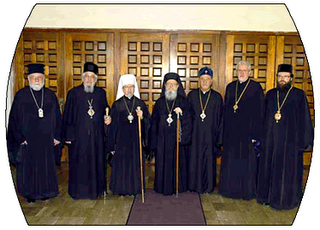On this fifth anniversary of the terrorist attacks on America, I wanted to explore the current state of this third "world war."
The three great Abrahamic faiths - Judaism, Christianity, and Islam - share many similar theological positions. Most of these similarities are seen in the moral teachings of these three religions.
But Christianity shares something with Islam that it doesn't share with Judaism and that is a missionary spirit. Christians were commanded by Christ to make disciples of every nation and the Koran commands Muslims to bring all people to the prophet's teachings. These missionary commands mean that Islam and Christianity constantly face the possibility of a collision, and this has happened on more than one occasion.
The history of Christian and Muslim relations has always been tenuous at best, with usually the Christian population being made "second class citizens" (the law of dhimini) in Islamic countries. After the lightening fast and violent overthrow of the Christian population of the Middle East with the rise of military Islam, the prophet's armies swept whole Christian populations away, either through martyrdom or forced conversions. The response of the West was slow in coming, but finally the West reacted. The Crusades began and Jerusalem was temporarily recaptured.
Unfortunately, the Crusades were ultimately a disaster for the faith and the West. But this shouldn't surprise anyone, since our Lord told Peter to put his sword away because "he who lives by the sword, dies by the sword."
In our own day, we now face a radicalized Islam. Some would say that the Islam we face today is actually the Islam the prophet intended. It certainly is the face of Islam at its beginning. Islam has always grown through military efforts. There is scant evidence of any other missionary strategy ever spreading Islam to a people group outside of conquest. Note that there are no Christian churches in Saudi Arabia, and in fact it is illegal to convert to another religion from Islam under Islamic law. As an aside, I wonder how many Muslims would convert to Christianity if they were not threatened with death?
Fighting fire with fire will not prevent militant Islam from attempting to do what they failed to do during the Middle Ages, that is bring Europe under control of Sharia Law.
So, how do we address Islam and deal with this threat to Christianity?
By addressing this threat in the proper arena - theology! Islam will be shown to be what it has always been - a Christian heresy - by a robust theological response.
But that would require us to reinvigorate our own theological education and seriously embrace the theological wisdom of the Undivided Church.
Here are three areas to focus on and to study that I believe will help us successfully combat the theological weaknesses of Islam.
First, the doctrine of the Trinity. The revelation of the Trinity is unique to Christianity. All three Abrahamic faiths declare fidelity to monotheism, but Christianity alone understands monotheism in a Trinitarian way. Islam rejects the revelation of the Trinity accusing Christians of polytheism. Islam goes further in declaring
"He begetteth not, nor is He begotten; and there is none like unto Him." Islam's strict (I would argue "wooden") monotheism teaches God as wholely other from His creation. Christianity maintains God's utter transcendence but also declares that God displays His power and love by actually entering into His creation through the miracle of the Incarnation and redeems humanity by assuming human nature into Himself. Without the doctrine of the Trinity Christianity has no theological defense against the rationalistic and anti-incarnational Muslim view of the Godhead.
Second, the doctrine of Humanity. Islam, like Christianity, sees humanity as fallen. But because of Islam's view of God, they also see humanity as gripped by "fate." The famous Muslim exclaim of
"inshallah" or "if God wills" denotes the fatalism that enslaves both the righteous and unrighteous in Islam. Man is not seen as joyfully and lovingly created for intimate communion with God, but only as the object of God's mastery. God is always and forever separated from His creatures and all we are left with is subservient obedience. Man was made to fear God.
Christianity on the other hand, has a much more positive view of humanity. While fallen, to be sure, we are not left to ourselves to reach God and remedy this fallen state. No, being the object of Divine Love, our God comes to us to rescue us and restore us to intimate communion. Man was made to love God.
Finally, the doctrine of Redemption. Both Islam and Christianity see the need for redemption for humanity. However, because of Islam's view of God and Man, redemption in Islam is based on rationalistic obedience to the revelation of the prophet in the Koran and the subsequent "hadith" or sayings of the prophet recorded by his followers. The redemption envisioned by Islam is based on rewarding the faithful for their obedience and works of righteousness. The hope of reward and the avoidance of punishment are the main motivators for the follower of Islam.
Christianity, on the other hand, since its view of God is not only more Personal, but also Incarnational, sees redemption as initiated by a loving God coming to rescue His creation from mortality by entering into mortality and death and swallowing up the poverty of mortality into the unconquerable victory of His own immortality. This salvation is received by the Christian as he is integrated in the salvific community called the Church through holy baptism and the regular participation of the live of the Church, which is actually the life of the Resurrected Lord in the midst of His Body, the Church. All of this is made possible by the active and ever-present presence of the Holy Spirit where the Spirit creates an intimacy between the believer and the Uncreated God that transcends mortality and time.
This Trinitarianan understanding of redemption is at the heart of a doctrine of salvation that is antithetical to the sterile and fatalistic doctrine of salvation in Islam.
The only way radical Islam will be confronted and defeated is with a robust theological defense of the classic Christian theology of the Church. Weapons and political might will not overcome the heresy of Islam. Only the Good News of the Christian Gospel can liberate this world from what is essentially a Christian heresy.
It is time for the faithful to be what they are called - reason endowed sheep of the Master's flock.



















